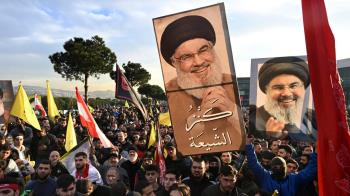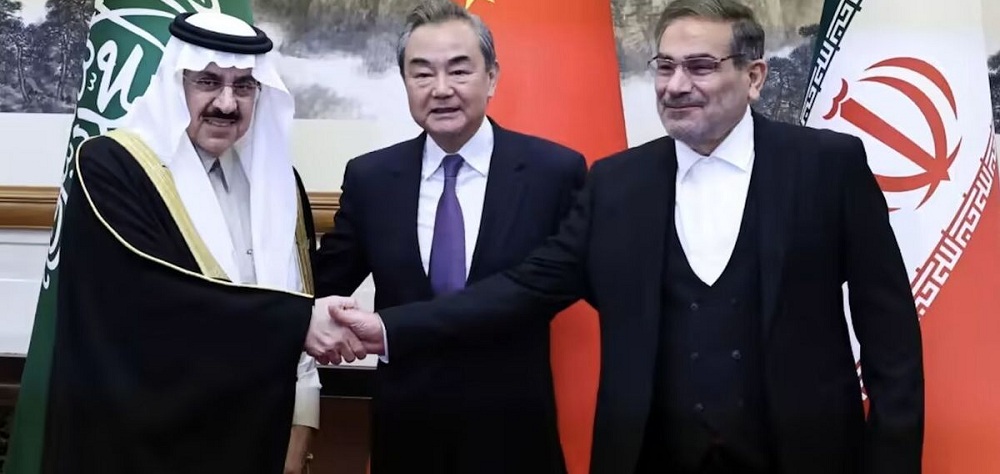Alwaght- These days, the name of Supreme National Security Council’s chief Ali Shamkhani shines in the Iranian diplomatic scene more than any other figure; the man who inked the détente agreement with Saudi Arabia in Beijing, setting the path for rapprochement with other Arab countries. After his successful mission in Beijing, Shamkhani, who is a retired navy admiral, flew to the UAE on Thursday to settle the differences emerged between Tehran and Abu Dhabi in the past years over regional issues, with reports from his meetings with Emirati officials describing his talks and their results promising. He then visited Iraq on Sunday and met with senior Iraqi officials. He signed a security MoU with Baghdad, helping ease the Islamic Republic’s security concerns posed from the Iraqi borders.
For elaboration on the visits of Shamkhani to regional countries, Alwaght arranged an interview with Hassan Hanizadeh, an Iranian expert of West Asian affairs.
Alwaght: Having in mind that Iran and Saudi Arabia agreed to resume diplomatic ties, Mr Ali Shamkhani visited regional countries over the past few days which seem not irrelevant to the recent agreement with Saudi Arabia. What do you think is the objective of the visits?
Hanizadehn: Actually, after the recent agreement between Iran and Saudi Arabia, a new horizon was opened for bilateral relations in particular and Iranian-Arab relations in general. This agreement actually has paved the way for regional convergence. Given the fact that China needs the Iranian and Saudi energy for its thriving economy, on the one hand it pushes to cut the American influence in the region and on the other hand use the energy capacities of the two oil-rich Persian Gulf countries without any security costs. The agreement was a product of months of Tehran-Riyadh negotiations in Baghdad and the Chinese managed to bring their views close to each other. It was after this agreement that Shamkhani visited the Emirates. Now a new approach has emerged among Emirati officials about getting closer to Iran and it seems that in the near future, the Emirates will scale up its political and economic ties to Iran. Also the course of developments indicates that Bahrain is eyeing improving political relations with Iran.
Alwaght: What are the achievements of Shamkhani’s UAE visit?
Hanizadeh: Concerning the UAE, it should be said that this country is economically very important in the region, and now the UAE’s currency dirham can be exchanged as an alternative currency to the dollar in parallel in the Iranian market and can supply the foreign exchange needs of the Iranian market. Therefore, the level of commercial turnover between Iran and the UAE will increase in the future, and forecasts indicate that their trade relations will touch $20 billion per year, and this is one of the positive effects of the recent agreement between Iran and Saudi Arabia. Since the UAE is a member of the Persian Gulf Cooperation Council, this country will play an important role in the convergence between Tehran and the Arabs of the region.
Alwaght: What goal did take Shamkhani to Iraq and meeting with senior political and security officials?
Hanizadeh: During visit to Baghdad, security issues were prioritized over other issues and a security Memorandum of Understanding was signed between Shamkhani and his Iraqi counterpart Qasim al-Araji, signaling that convergence in security and political areas has emerged between the two countries. According to the accord, Iraqi army is set to deploy to borders with Iran, namely in Kurdistan region, to block penetrations into Iranian territories by separatist terrorists. Therefore, Shamkhani’s visits to the UAE and Iraq were strategic and will leave their effects on the region and Iran in the future.
Alwaght: How implementable is the agreement to counter terrorist and separatist groups based in Iraq? We know that in recent months, Iraqi government planned some measures to this end but was not much successful. Will this time the plans be pursued more seriously?
Hanizadeh: Terrorist group operate about 100 bases in Iraq’s Kurdistan region. They launched operations against Iran in the past. Since the start of the riots in Iran, they intruded the Iranian territories and caused security problems to the Iranian territorial integrity. So, it is crucial to counter them. From another aspect, Iraqi central government has not much influence in Kurdistan region but with the security agreement, the government and army will have to take over the security and border control. One of the main demands of Tehran from Baghdad and Erbil is elimination of the terrorist bases and the agreement can set a prelude for lasting peace and security in Iran’s western borders.
Alwaght: Diplomatic visits and signing apolitical agreements is a duty of the foreign ministry and it usually has to do such jobs. Why was Shamkhani picked for these diplomatic visits?
Hanizadeh: Concerning Shamkhani choice for the mission, it should be said that the Iranian-Saudi differences were not limited to political issues and if these differences had just diplomatic aspects, naturally the foreign ministry would have stepped in. But the relations of the two countries go beyond political issues. Having in mind that the Supreme National Security Council covers several security ministries, Shamkhani continued Beijing negotiations with total discretion granted by the president and finally struck a deal. The Supreme National Security Council has security and political duties and there is no contradiction with the duties of the foreign minister and diplomatic apparatus, and the foreign ministry and the Supreme National Security Council work to create convergence and protect security at home and in the region concertedly.
Alwaght: Given the readiness of the Arab countries to resume ties with Iran, are such visits likely to be paid to other countries like Bahrain, Jordan, and Egypt? How likely is the progress in Iran’s relations with other Arab countries of the region?
Hanizadeh: After Iran’s agreement with Saudi Arabia, Jordan and Egypt showed tendency towards rapprochement to Iran in an apparent sign their leaders shifted views on Tehran. The next year seems to be a year of regional convergence and Iran will settle its problems with Arab countries and this will isolate the US and Israel in the region. The more security and stability, the less Israeli and American influence as Beijing agreement will bear significant security and economic influence in the region. Also, Yemen war, which cost Saudis about $350 billion, will end soon, and, in fact, one of Tehran’s demands in agreement with Riyadh was end of Yemen war.



























